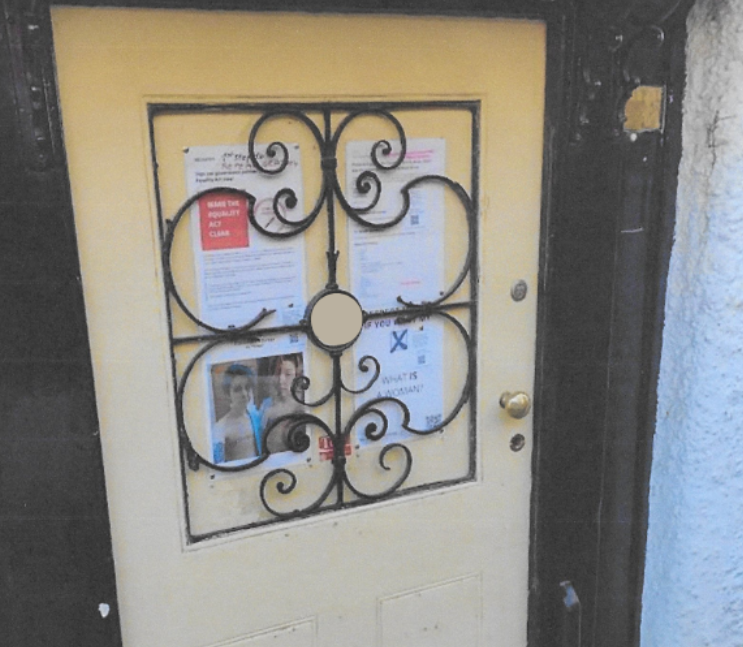A pensioner has been threatened with a substantial fine by her Stonewall-affiliated council over gender-critical posters she fixed to her front door, report Alex Ward and Jo Bartosch for the Mail.
The front door display, which the Council labelled “hate speech”, includes materials from campaign groups Transgender Trend, Sex Matters, and Women’s Rights Network.
68-year-old Una-Jane Winfield was handed a Community Protection Notice (CPN) after the council received complaints she was displaying “transphobic” and “graphic” posters.
CPNs were introduced in England and Wales under sections 43 to 58 of the Anti-Social Behaviour, Crime and Policing Act 2014. According to the government, they constitute “punishments for antisocial behaviour”, and are “intended to deal with unreasonable, ongoing problems or nuisances which negatively affect the community’s quality of life”, including “drunken or threatening behaviour, vandalism and graffiti, [and] playing loud music at night”.
Winfield now faces prosecution and a £2,500 fine by Labour-run Hammersmith and Fulham Council over the four small images and letters on the entrance to her west London home.
The posters include an advert for Helen Joyce’s book, Trans: When Ideology Meets Reality, an image from the documentary Adult Human Female, which explores the clash between women’s sex-based rights and trans rights, and an anonymous handwritten letter supporting Ms Winfield’s gender-critical views.
Also featured as part of the domestic polyptych is an A4 photograph of two young women bearing the scars from breast removal surgery. Despite the anonymous complainant’s apparent distaste for the material, real-world consequences of gender identity theory when presented in a dissenting, politicised context, aestheticised representations of mastectomy scars have in fact featured in various mainstream advertising campaigns over recent years, including by companies like Braun, Burberry and Costa Coffee.

Winfield received her first official warning from Council bureaucrats last March, when she was told her “persistent and continuing conduct” was having a “detrimental effect on the public and the LGBT community”.
Three months later, the council issued its CPN, ordering her to remove the posters, which she refused to do. In its notice letter to Winfield, the Council stated: “Your behaviour: Your actions towards sexual orientation and displaying pictures that do not belong to you is a breach of freedom of speech and hate speech.” This warning was withdrawn six months later only for her to receive a second order in August, again followed by a CPN.
Winfield says she believes she was singled out in what constituted a political attack for supporting women’s rights. She added: “The police came to have a look at my door on two separate occasions. Thankfully they understood that expression of gender-critical views is protected under the law. But the council has ignored the police.”
Channelling the spirit of Mary Whitehouse, a spokesperson for Hammersmith and Fulham Council said: “We have received eight complaints about these provocative and graphic posters featuring nudity prominently displayed on a very busy public section of walkway in plain view.
The spokesperson for the Council, which measures its performance using Stonewall’s Workplace Index, continued: “Despite our requests, the resident has refused to remove them and has instead taken this issue to court.”
Posters and other forms of visual communication have become a particular point of contention for trans activists and their allies.
Back in 2021, Police Scotland put out a much-ridiculed call for the public to come forward if they see “controversial stickers” being put up by gender critical feminists.
Inevitably, officers were then called to a pub in Edinburgh a few months later after a bar person objected to stickers a member of the group had left in the ladies lavatory campaigning against proposed reform of the Gender Recognition Act, which will make it easier for people to legally change their gender. The member of staff told the women to leave the pub and take their “hateful” stickers with them – and when they refused, Police Scotland were called in to investigate.
Last year, a pensioner in Hebden Bridge, West Yorkshire, was quizzed by the police on suspicion of a hate crime, having stopped while out on a walk to take a photo of a sticker on a Pride poster that carried the ‘gender critical’ message “Keep Males Out Of Women-Only Spaces”.
Four weeks later, officers swooped on her home in order to question her about the photo. She had been identified from CCTV footage, they said, before proceeding to question the 73-year-old suspected thought criminal over her suspicious recreational camera use for the next 30-minutes. (West Yorkshire Police Force has the second-highest crime rate in the UK, with over 80% of reported cases of burglary getting closed without a suspect ever being identified.)
“I think they wanted to correct my thinking,” she later told Reduxx. “They are getting involved in a very divided and toxic debate, but it’s not their role to arbitrate political disagreements. I felt as if they were trying to gag a dissenting voice by harassing me in my own home.”
After the interrogation, the police advised the septuagenarian that in taking a photograph of an inanimate object on a public pavement outside a building, “no crime had taken place”.
However, thanks to a Data Access Request the woman later submitted, she learnt that the investigation had in fact been catalogued as a non-crime hate incident (or NCHI) by West Yorkshire Police (an NCHI is any non-crime incident “which is perceived by the victim or any other person to be motivated by hostility or prejudice”).







